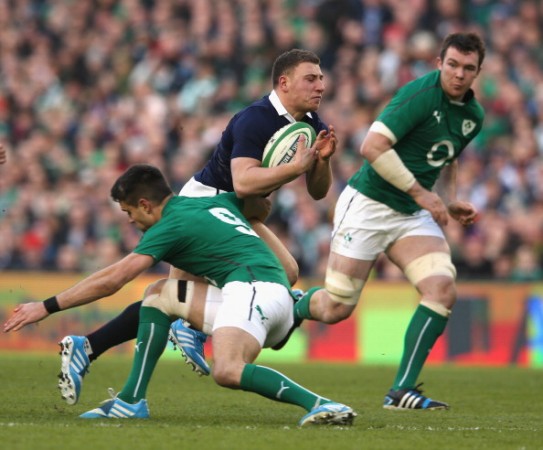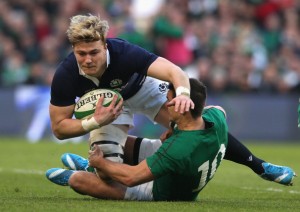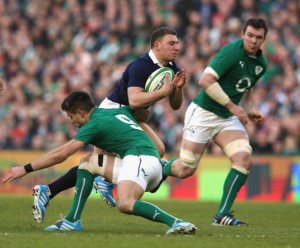
Silver lining: Hogg was adventurous against Ireland but had little support when he created a half-break
By Alan Dymock
AS INSIPID as an intro about Groundhog Day would be it, is cruelly apt that the famous holiday fell on the same day as Scotland plodded into Dublin. In their RBS 6 Nations opener they hit a brick wall, wilting notably in a second half where Ireland came into a canter. Many predicted Ireland would win, and the 28-6 scoreline made soothsayers of us all.
So what was freshly discovered by Scotland in an all-too scripted afternoon of Championship rugby?
They have to convert the half-breaks
Stuart Hogg was adventurous. He backed himself when others would have thrown kicks at the Gods, but with only Sean Lamont hanging off a shoulder or Alex Dunbar rucking and tackling enough for three people, everyone else has a duty to work their little blue socks off to turn a half-break into a buxom, full one.
Little continuity meant that all Ireland had to defend was a week imitation of Wales’ Warrenball and David Denton running straight and hard once the ball swung back to the side of the pitch he was on.
Back row balance is a must
If – and it’s a big if – you insist on having the niggle and fists of Jim Hamilton in there beside the defensive impressiveness of Tim Swinson, you don’t need two hard-working, straight-line thinking flankers on either side of Denton. Kelly Brown is as close to a first-ruck response team as Scott Johnson will allow on the field, so he needs something different at six. Johnnie Beattie may have his detractors, but at least he looks up and around when he has the ball. He is unpredictable. He gets defenders thinking.
Alex Dunbar needs to be praised publicly
So much of International rugby is about confidence, and while everyone talks about the need for Matt Scott’s guile, Dunbar hits everything with full power. If he can grow in stature as Scott has since last year, Scotland could actually have an impressive centre pairing. Pull him up on his brilliance and tell the rest of the team to match him.
Time is needed at fly-half
Scotland’s second half in Dublin was abject, but there were, between the pedestrian plays, some nice tactical kicks from Duncan Weir. Stick with him, let Scott and Dunbar bond outside him, and there could be at least three people on the same page. He may not shift fast enough to create enormous space for his centres, but Weir can get used to this level and his back-line used to him. Hang your hat on them and trust them to figure out why they don’t make huge numbers of breaks. They may surprise you – especially after seeing loop after loop from Ireland, first hand.
Set-piece is a concern as England visit
Loose lineouts are bad enough, but when scrum ball isn’t hooked either, it’s going to be a long old afternoon. You have to feel for Ross Ford. Uncomfortable when thrust into the striplights as captain of Scotland, he never raised his game as he was hoped to have done. He has been in need of serious competition for some time. No one has really been afforded the chance. Pat MacArthur will get a lot of calls to come in, but even if he is not the long-term solution, something needs to change. The lineout was just too meek on Sunday, as if neither the pack or the hooker really trusted each other to complete their side of the arrangement.
A bold move has to be taken now. Not months before the World Cup. After all, what if Ford went down? Then you have a relatively inexperienced replacement. In the middle of your two vital restarts.







